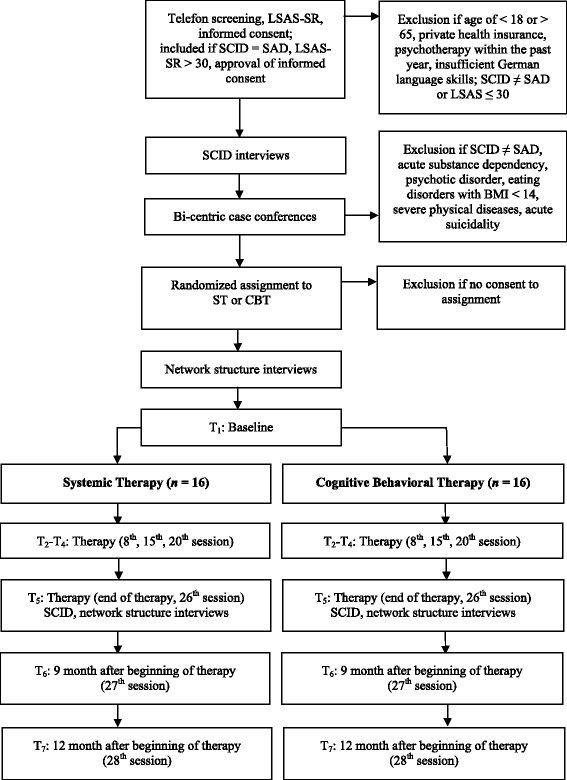Comparing systemic therapy and cognitive behavioral therapy for social anxiety disorders: study protocol for a randomized controlled pilot trial
- PMID: 27029546
- PMCID: PMC4815062
- DOI: 10.1186/s13063-016-1252-1
Comparing systemic therapy and cognitive behavioral therapy for social anxiety disorders: study protocol for a randomized controlled pilot trial
Abstract
Background: Social anxiety disorders are among the most prevalent anxiety disorders in the general population. The efficacy of cognitive behavioral therapy (CBT) for social anxiety disorders is well demonstrated. However, only three studies point to the efficacy of systemic therapy (ST) in anxiety disorders, and only two of them especially focus on social anxiety disorders. These ST studies either do not use a good comparator but minimal supportive therapy, they do not use a multi-person ST but a combined therapy, or they do not especially focus on social anxiety disorders but mood and anxiety disorders in general. Though ST was approved as evidence based in Germany for a variety of disorders in 2008, evidence did not include anxiety disorders. This is the first pilot study that will investigate multi-person ST, integrating a broad range of systemic methods, specifically for social anxiety disorders and that will compare ST to the "gold standard" CBT.
Design: This article describes the rationale and protocol of a prospective, open, interventive, balanced, bi-centric, pilot randomized controlled trial (RCT). A total of 32 patients with a primary SCID diagnosis of social anxiety disorder will be randomized to either CBT or ST. Both treatments will be manualized. The primary outcome will include social anxiety symptoms at the end of therapy. Therapy will be restricted to no more than 26 hours (primary endpoint). Secondary outcomes will include psychological, social systems and interpersonal functioning, symptom adjustment, and caregiver burden, in addition to change measures, therapist variables and treatment adherence. At the secondary endpoints, 9 and 12 months after the beginning of therapy, we will again assess all outcomes.
Discussion: The study is expected to pilot test a RCT which will be the first to directly compare CBT and multi-person ST, integrating a broad range of systemic methods, for social anxiety disorders, and it will provide empirical evidence for the calculation of the number of patients needed for a confirmatory RCT.
Trial registration: ClinicalTrials.gov: NCT02360033 ; date of registration: 21 January 2015.
Keywords: Adherence; Cognitive behavioral therapy; Manual development; Pilot; Randomized controlled trial (RCT); Social anxiety disorder; Systemic therapy.
Figures
Similar articles
-
Comparing Cognitive Behavioral Therapy and Systemic Therapy for Social Anxiety Disorder: Randomized Controlled Pilot Trial (SOPHO-CBT/ST).Fam Process. 2020 Dec;59(4):1389-1406. doi: 10.1111/famp.12492. Epub 2019 Oct 27. Fam Process. 2020. PMID: 31657011 Clinical Trial.
-
Group schema therapy versus group cognitive behavioral therapy for social anxiety disorder with comorbid avoidant personality disorder: study protocol for a randomized controlled trial.Trials. 2016 Oct 8;17(1):487. doi: 10.1186/s13063-016-1605-9. Trials. 2016. PMID: 27717405 Free PMC article. Clinical Trial.
-
Collaborative care for panic disorder, generalised anxiety disorder and social phobia in general practice: study protocol for three cluster-randomised, superiority trials.Trials. 2017 Aug 16;18(1):382. doi: 10.1186/s13063-017-2120-3. Trials. 2017. PMID: 28814317 Free PMC article. Clinical Trial.
-
Social anxiety disorder in Black American adolescents: Cultural considerations in conceptualization, assessment, and treatment.Bull Menninger Clin. 2024 Spring;88(2):171-195. doi: 10.1521/bumc.2024.88.2.171. Bull Menninger Clin. 2024. PMID: 38836849 Review.
-
Cognitive behavioral group therapy for social anxiety disorder - A critical review of methodological designs.J Anxiety Disord. 2024 Oct;107:102928. doi: 10.1016/j.janxdis.2024.102928. Epub 2024 Sep 13. J Anxiety Disord. 2024. PMID: 39303446 Review.
Cited by
-
Integrative systemic and family therapy for social anxiety disorder: Manual and practice in a pilot randomized controlled trial (SOPHO-CBT/ST).Front Psychol. 2022 Nov 4;13:867246. doi: 10.3389/fpsyg.2022.867246. eCollection 2022. Front Psychol. 2022. PMID: 36405178 Free PMC article.
-
When Significant Others Suffer: German Validation of the Burden Assessment Scale (BAS).PLoS One. 2016 Oct 20;11(10):e0163101. doi: 10.1371/journal.pone.0163101. eCollection 2016. PLoS One. 2016. PMID: 27764109 Free PMC article.
References
-
- Scientific Advisory Board on Psychotherapy. Gutachten zur wissenschaftlichen Anerkennung der Systemischen Therapie. Berlin: Scientific Advisory Board on Psychotherapy; 2008. Available from: www.wbpsychotherapie.de.
-
- Sydow K, Beher S, Retzlaff R, Schweitzer J. Die Wirksamkeit der systemischen Therapie/Familientherapie. Göttingen: Hogrefe; 2007. p. 182.
-
- Knekt P, Lindfors O, Härkänen T, Välikoski M, Virtala E, Laaksonen MA, et al. Randomized trial on the effectiveness of long- and short-term psychodynamic psychotherapy and solution-focused therapy on psychiatric symptoms during a 3-year follow-up. Psychol Med. 2008;38:689–703. doi: 10.1017/S003329170700164X. - DOI - PubMed
-
- Willutzki U, Neumann B, Haas H, Koban C, Schulte D. Zur Psychotherapie sozialer Ängste: Kognitive Verhaltenstherapie im Vergleich zu einem kombiniert ressourcenorientierten Vorgehen. Z Klin Psychol Psychother. 2004;33(1):42–50. doi: 10.1026/0084-5345.33.1.42. - DOI
Publication types
MeSH terms
Associated data
LinkOut - more resources
Full Text Sources
Other Literature Sources
Medical


